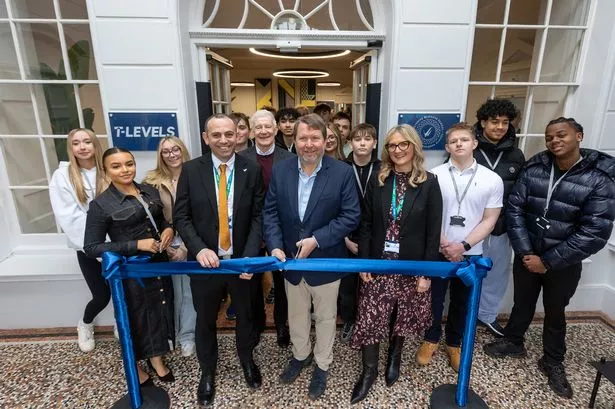UK housing market value surpasses £9 trillion, driven by easing affordability

The total value of all UK homes has eclipsed the £9 trillion mark for the first time, as revealed by new insights from property experts at Savills.
Following a slight downturn in 2023, the UK housing market rebounded with a formidable £346bn increase last year – now standing at over 3.5 times the nation's annual GDP, as reported by City AM.
"Affordability pressures eased and prices returned to growth in many areas [in 2024], pushing the total value of the UK's housing stock to another record high," commented Lucian Cook, Savills' head of residential research.
The property market faced significant challenges in 2023 amidst soaring borrowing costs and purchaser hesitancy leading to delayed transactions.
During August 2023, average mortgage rates for two and five-year fixed deals surged past six percent. However, mortgage interest rates have been on a downward trend over the past year, aligned with consecutive reductions in the Bank of England base rate.
Data from Mojo Mortgages indicates that the average rate for a two-year fixed mortgage dropped to 4.7 percent by the end of 2024.
Promising signs for a further uptick in house prices this year were highlighted as Rightmove's house price index reported a 0.5 percent rise in January, taking the average listing price to £367,994.
"The confident start to 2025 continues, with more sellers coming to market and good levels of activity," stated Tomer Aboody, director of financial services firm MT Finance.
Lawrence Cook of Savills commented: "With the Bank of England expected to cut interest rates further over the coming months, we anticipate an increase in transactional activity, particularly among second-steppers who have held off moving until rates fall."
Moreover, mortgage lending regulations look set to relax. Nikhil Rathi, CEO of the FCA, has stated in a letter that the body will "begin simplifying responsible lending and advice rules for mortgages, supporting home ownership and opening a discussion on the balance between access to lending and levels of defaults".
Recommend


Enterprise
Creative agency becomes staff owned
A PR and creative agency marking 30 years in business and has become entirely employee-owned. The 50-strong team at Rees Bradley Hepburn in Meriden are now shareholders in the business following a sale deal by co-founders Tim Rees and Debra Hepburn. An employee ownership trust has been set up which now holds 100 per cent of the shares for the benefit of RBH staff. Email newsletters BusinessLive is your home for business news from across the West Midlands including Birmingham, the Black Country, Solihull, Coventry and Staffordshire. Click through here to sign up for our email newsletter and also view the broad range of other bulletins we offer including weekly sector-specific updates. We will also send out 'Breaking News' emails for any stories which must be seen right away. LinkedIn For all the latest stories, views and polls, follow our BusinessLive West Midlands LinkedIn page here. Ms Hepburn will remain in her role as managing director, with Mr Rees becoming a trustee alongside current staff members Jo James, Kevin Bishop and Honor Nicholls. The RBH board will continue to be responsible for the day-to-day running of the business. Ms Hepburn said: "When we set up RBH, we wanted to create a flat structure, one where people sat together in an open flow space, where ideas could come from anywhere. "Where we could make things happen for our clients brilliantly and fast, without complex management layers. And we wanted RBH to be 'our agency' where everyone felt valued and able to contribute and to enjoy the rewards. "We have had countless suitors over the years, even more in the last year or two. But we have stayed fiercely independent and have never wanted to work for anyone else or work in a different way. "The trust allows RBH to stay in charge of its own future and protects the opportunity for all RBHers to make a good and happy living.


Enterprise
Healthtech start-up bags Europe's largest pre-seed funding round for female founders
UK-based healthtech start-up Level Zero Health has successfully raised $6.9 million (£5.5 million) in pre-seed funding, setting the record for the largest amount garnered by female founders in Europe to date. The investment, spearheaded by the European venture capital firm Redalpine, is aimed at bolstering the company's ambitious goal to transform hormone tracking, as reported by City AM. The funds are earmarked for furthering the development of the world's pioneering remote and continuous hormone monitoring device, which utilises novel DNA-based sensors for operation. Founded just over a year ago by former Palantir tech lead Ula Rustamova and medical device specialist Irene Jia, previously with Philips, Level Zero Health's achievement establishes a new standard for female-led startups across Europe, drawing 70 percent of the investment from within the region. The company's innovative approach centres on a non-invasive wearable patch that adheres to the user's arm, furnishing them with instantaneous hormone level readings. This technological solution offers continuous measurement of hormone levels, unlike conventional blood tests that provide only snapshot data points. The implications of this technology are vast and could impact various areas including fertility treatment protocols, menopause management, and stress tracking amongst others. Testing of the sensor's capabilities in simulated samples has demonstrated a formidable 98 percent accuracy rate, surpassing general industry benchmarks. Chief Executive Ula Rustamova has expressed her enthusiasm about the breakthrough, stating: "Our innovative remote monitoring technology marks an enormous leap in hormone testing." Level Zero Health has raised £4.2m in pre-seed funding, with the company's innovative hormone tracking solution attracting significant investment. "This funding will enable us to bring this revolutionary solution to the market, making hormone tracking more accessible and insightful than ever before". Level Zero has already gained a strong following of potential customers, despite being in its early stages. The funding will be used to advance research and development, as well as expand the team. While initially focusing on business-to-business (B2B) clinical applications, the company plans to expand into consumer health and pharmaceutical markets. Redalpine investor and Level Zero Health board member, Philip Kneis, said: "We did it for blood pressure, and we will do it again for hormones. Continuous hormone measurement is one of the holy grails of diagnostics". The company's clinical advisory board includes experts such as Harvard Medical School's Aaron Styler and reproductive science expert Joshua Klein.


Enterprise
Alton Towers operator Merlin Entertainments names new full-time chief executive
Merlin Entertainments, which operates premier attractions like Alton Towers, Legoland, and Madame Tussauds, has announced Fiona Eastwood as its new permanent chief executive. Eastwood took on the position on an interim basis from November 2024 and now officially replaces Scott O’Neil, who departed after a two-year tenure, as reported by City AM. O'Neil succeeded Merlin stalwart Nick Varney, who left in late 2022. In the UK, Dorset-headquartered Merlin also manages Chessington World of Adventures, the London Eye, and Thorpe Park, among others. Globally, Merlin Entertainments runs a portfolio of 140 attractions, drawing over 60 million visitors annually. Ownership of the company rests with Blackstone, a family-owned enterprise linked to the Lego brand, and Canada's most significant pension fund. Eastwood, formerly the group's COO responsible for Gateway Attractions—including Madame Tussauds, the Eye brands, Sea Life, and the resort theme parks—joined the company in 2015 as the global marketing director for gateway attractions. Before Merlin, she held the post of managing director of consumer products at BBC Studios. On her appointment, Eastwood commented: "It’s an honour to be chosen to lead Merlin. It is a truly world class company, with remarkable global reach and impact." She added: "Over the past decade, I have seen first hand what the business is capable of. My task, as CEO, is to lead Merlin to new heights, with a focus on performance, creativity, operational excellence and guest experience. "I am grateful to the board for their support – and look forward to continuing to work with an exceptional management team and our colleagues worldwide to implement the business’s transformational strategy. Together, we will drive growth at scale and help Merlin reach its full potential." For its 2023 financial year, Merlin Entertainments reported a turnover of £2.1bn, marking an eight per cent increase from the previous year, although it faced a pre-tax loss of £214m. Chairman Roland Hernandez remarked, "Fiona has a deep understanding of the business, the strategies required for sustainable growth, and the vision to spearhead our ongoing transformation.


Enterprise
Newcastle canning company CRL Foods gets £1m Northern Powerhouse investment
A Newcastle food and drink canning company has secured a £1m investment from the Northern Powerhouse Investment Fund II. CRL Foods has developed patented technologies to manufacture a range of ready-to-drink beverages including cold brew coffees, teas and protein drinks. It has secured a £1m investment from NPIF II - Maven Equity Finance, following two earlier Maven deals from other funds that allowed it to add new production lines and take on staff. The new deal will allow CRL to scale rapidly and deliver significantly higher volumes following a number of new contract wins. The company’s technology allows longer shelf life for some products as well as providing recyclable packaging. Gareth Phillips, MD of CRL Foods, said: “At CRL, we are on a mission to improve the quality and sustainability of thermally processed food and beverage products in the UK, and ultimately worldwide, by providing innovative and value-added contract manufacturing solutions. We are delighted to have Maven’s continued support with this latest round of growth capital funding to accelerate our progress towards these goals.” David Nixon, senior investment manager at Maven said: “CRL is a growing business that has utilised its unique manufacturing processes to develop a strong order book from high-quality customers since we first supported the firm back in 2021. The company is well positioned to support increasing consumer demand for healthy and sustainable food & drink, and they have achieved impressive year on year growth to date. The team has many years’ experience within the food and beverage industries, and we’re delighted to support them at such a pivotal point in the company’s development.” Sarah Newbould, senior investment manager at the British Business Bank said: “NPIF II is driving innovation across the North and its recent investment in CRL Foods exemplifies this commitment. This investment demonstrates how the Fund supports a broad range of industries to drive technological advancement and boost growth across the regional economy.”


Enterprise
Moonpig founder and former Dragons' Den star opens new Wiltshire business school
A new multimillion-pound business school in Wiltshire has officially opened. Former Dragons' Den star Nick Jenkins took part in the ribbon-cutting ceremony to mark the launch of Wiltshire College and University Centre’s new Wiltshire Business School. The Moonpig founder said school, at the college's Lackham campus near Chippenham, would be an "asset" to the county and "great for local businesses". “I'm very impressed with the facilities here and I think it's fantastic that it is in Wiltshire,” said Mr Jenkins. “I want to be employing people who have had the kind of training on offer here.” Wiltshire Business School is based in the Georgian Grade II listed building Lackham House, which is part of a £2.2m development at the college’s Lackham campus. As well as traditional classrooms, the school has meeting rooms fitted with wireless digital screens; laptop docking stations; video conferencing equipment; breakout areas with collaborative desk set-ups; and work pods resembling co-working spaces. There is also an oak-panelled boardroom in what was once the house’s billiard room. Principal and chief executive Iain Hatt said Wiltshire Business School would teach commercial skills in a setting that "looks and feels like 21st century offices". “We’ve created high-quality training facilities that reflect businesses today, so students can learn in a modern business environment,” he said. “We will deliver the core curriculum requirements to our students in terms of the technical skills they need but alongside that we’ll develop the habits and behaviours that will prepare them for work.” Mr Hatt said the business school was built in response to the introduction of T Levels, a new qualification designed with employers that combines learning at the college with up to 315 hours of real-world experience in industry. He added that it would also help address the digital skills gap identified in the Swindon and Wiltshire Local Skills Plan. At present students are studying T Level Business: Management and Administration at the business school but Mr Hatt expects the number of students to grow over the next two years as other courses are introduced. “We’ve had excellent feedback from the employers who’ve been in to see it and the students love it,” he said. “Since 1946 when it opened its doors as the Wiltshire Farm Institute, Lackham has always been at the cutting edge of education and with Wiltshire Business School we are future proofing our teaching for the next generation.” The college is planning to open up the school to businesses for part-time courses, including HR, accountancy and leadership.


Enterprise
Sheffield's One Health Group looks to create surgical hub through £8m fundraise
Sheffield healthcare company One Health Group is looking to raise £8m to fund the creation of its first surgical hub amid a move to the AIM market. The firm, a leading independent surgical services provider to the NHS has announced a conditional placing to raise a minimum of £7m, an open offer to qualifying shareholders to raise up to £500,000, and a retail offer to raise up to £500,000. The firm is also proposing to cancel trading on the AQSE Growth Market and admission to AIM. In an announcement to the market, it said proceeds would be used primarily to fund the group’s first owned surgical hub through to operation, a project which is expected to cost between £8m and £9m. The group expects the hub to be operational within one year of construction starting and deliver between £6m and £9m in annual revenues, while also being earnings enhancing in its first full year of operation. Planning permission for the surgical hub is expected to be submitted soon. The placing to raise a minimum of £7m consists of an issue of new ordinary shares to raise £5.2m, and the sale of existing ordinary shares held by certain directors and the company’s EBT Trustee to raise at least £1.8m. The capital raising is conditional upon admission of the Enlarged Share Capital to trading on AIM, cancellation of trading on the AQSE Growth Market and the passing of the Resolutions at the General Meeting. In addition, the company intends to launch an offering to both new and existing retail shareholders in the United Kingdom of up to 277,777 new ordinary shares through the retail offer. The announcement says: “The board considers admission to be in the best interests of the company and its shareholders given the growing scale of the business. The board believe AIM is a more appropriate market for the company and will enable it to attract a wider pool of investors, provide greater access to capital for growth and, over time, improve liquidity in the ordinary shares.” Its proposed move from the AQSE Growth Market to AIM are both conditional on completion of the placing and the open offer, and the passing of the resolutions at a general meeting. Should everything go ahead, admission to AIM is expected to take place on March 20.


Enterprise
CTD deal by Topps Tiles sparks competition warning from CMA
The UK’s competition authority has ruled that the acquisition of former Newcastle firm CTD Tiles could lead to competition issues in four areas of the country. The Competition and Markets Authority (CMA) has issued a warning that Topps Tiles’ acquisition of 30 stores from CTD Tiles could see businesses and shoppers in three parts of Scotland, plus Dorking in Surrey, facing worse deals or service due to the reduction in competition. Topps bought the stores for about £9m in August last year after CTD, which was the second largest specialist tile retailer in the UK behind Topps, fell into administration. That saw 56 shops and more than 250 job losses but the Topps deal saved part of the company. The Competition and Markets Authority (CMA) said it received several complaints after the agreement was confirmed, including concerns over “how the deal impacted businesses and retail customers in specific areas of the country”. Following an initial phase 1 investigation, the CMA found specific competition concerns in Dorking, Edinburgh, Inverness and Aberdeen, where it believes the deal could lead to worse deals and service for customers. Leicestershire-based firm Topps has until February 24 to submit proposals to allay the regulator’s concerns and avoid a potential, more thorough investigation. Joel Bamford, executive director for mergers at the CMA, said: “Having looked at the evidence, we’re concerned Topps Tiles’ purchase of CTD Tiles may reduce competition in Dorking, Edinburgh, Inverness and Aberdeen. This loss of competition could lead to worse deals and service in those areas. “Whether you’re retiling your own home or a business that provides renovation services, the merger could make such projects more expensive. Topps Tiles now has the opportunity to offer solutions to our concerns, otherwise this case will proceed to a more in-depth investigation.” In a statement to the stock market, Topps said in response: “The company will continue to work with the CMA in a constructive and professional manner, as it has done throughout this process. A further announcement will be made in due course.” Topps’ largest shareholder, MS Galleon, said the business had not identified concentration risk properly and faced “significant risk of remedies” from the deal.


Enterprise
Anglo American presses ahead with demerger of platinum business
Anglo American is pushing forward with the demerger of Anglo American Platinum, aiming for a June separation. The mining giant, which owns around 67% of the world's top platinum group metals (PGMs) producer, will seek shareholder approval for the split at its annual general meeting on April 30, as reported by City AM. Anglo American plans to retain a 19.9% stake initially but intends to gradually exit after the separation. This move is part of a broader strategic shift for the mining group. Anglo Platinum will operate independently, with its financials no longer consolidated under the larger group. Chief Executive Duncan Wanblad stated: "We are on a clear timeline towards demerging Anglo American Platinum – the world’s leading PGM producer – in June, with its primary listing on the Johannesburg Stock Exchange and an additional listing on the London Stock Exchange. "Consistent with our commitment to deliver a responsible demerger, Anglo American intends to retain a 19.9 per cent shareholding in Anglo American Platinum in order to further help manage flowback by reducing the absolute size of the shareholding that will be emerged. "Anglo American will no longer have any representation on the Anglo American Platinum board post demerger and we intend to exit our residual shareholding responsibly over time, and subject to customary lock-up arrangements." The mining company announced that the deal would result in an immediate cash boost for the group. It stated it would receive a total dividend payout of R16.5bn ($0.9bn) before the split, with the parent company's share amounting to approximately $0.6bn. The PGMs unit reported an adjusted EBITDA of R19.8bn ($1.1bn) for 2024.


Enterprise
Wood Group shares plummet 31% as Deloitte uncovers 'material weaknesses' in financial review
Shares in Wood Group have tumbled by 31% this morning following revelations from a Deloitte review that uncovered "material weaknesses and failures" within the company. The firm has acknowledged the need to "significantly" bolster its financial culture, governance, and controls after the review's findings, as reported by City AM. In a trading update, the London-listed engineering behemoth also disclosed intentions to expand its extensive cost-reduction strategy and now anticipates negative free cash flow in 2025. Wood Group had previously initiated a Deloitte-led inquiry in November due to substantial project write-offs, which resulted in a dramatic share price drop of over 50% in a single day. Despite this, on Friday, the company stated it does not foresee the inquiry’s outcomes having a "material impact" on its overall position or future cash-generating capabilities. Nevertheless, it is currently assessing the scale of prior-year adjustments and their effect on adjusted pre-tax earnings. "Following these actions, the business will be on a firmer operational footing, but cash generation has yet to materialise and financial strength needs significant improvement," the company communicated to the markets. Wood Group has also announced an escalation in its cost-saving measures for the coming year, with annual savings now projected to reach around $85m (£67.6m), a considerable increase from the $60m estimated last March. The engineering institution communicated a forecast of negative free cash flow ranging from $150m to $200m in 2025 while planning a one-off disposal of assets valued at around $70m. They anticipate that the full-year pre-tax profit outcomes will be consistent with market conjectures, yet the firm alerted to expectations of diminished underlying EBITDA. Chief Executive Ken Gilmartin expressed disappointment over the financial outcomes amidst ongoing changes: "This is a difficult announcement amid our transformation. While we have made progress, I am disappointed in our financial performance," he commented. Moreover, Gilmartin spoke of adopting forceful measures to capitalise on growth opportunities, particularly in the energy sector: "Consequently, we are taking decisive actions to ensure we can meet the opportunities we have in growing markets, principally energy." He also touched upon the anticipated consequences of an independent review, reassuring about its impact: "While the likely findings from the independent review are expected to have no material impact on the Group’s cash position and future cash generation, it clearly gives us areas to focus on and we are initiating steps now to further improve our financial culture, governance and controls."


Enterprise
SMEs could win more public sector contracts under new AI-powered procurement pilot in Greater Manchester
SMEs could win more contracts with local councils under an AI-powered procurement scheme being launched this morning. STAR Procurement – an organisation that looks after the procurement needs of four councils in Greater Manchester and another two from Merseyside – has begun a pilot scheme to help smaller firms and voluntary and community sector organisations (VCSOs) to win public sector contracts. It follows a campaign from the Federation of Small Businesses (FSB) to launch a procurement scheme in Greater Manchester to “ensure businesses are at the front of the queue to deliver goods and services needed by their own local authority”. The pilot will include Stockport, Tameside, Trafford and Rochdale councils – who together make up STAR – but the FSB hopes that if successful it will be extended across the city region. The FSB says smaller firms tend to see council procurement as “overly complicated, time consuming, and out of reach”. The pilot aims to make the process easier by using “an AI powered digital platform” to connect SMEs with lower value council contracts. It will focus at first on contracts of over £50,000 but will be reviewed as the pilot goes on and could go up to contracts worth as much as £213,000. Robert Downes, development manager for the FSB in Greater Manchester, said: “This is an exciting opportunity for businesses and councils in GM alike – and it’s something FSB has been campaigning for here in GM for a number of years. It’s great news for businesses based here as we begin the new year. “For smaller businesses and VCSOs who have traditionally seen public sector procurement as beyond their reach and aimed at large organisations, this will help open-up contracts that at the moment aren’t even officially advertised anywhere. This means many new contracts will be up for grabs for the first time with the clear aim to award to local businesses. These will be new opportunities for the smallest firms to deliver public sector contracts, minus the quite onerous processes that more expensive town hall contracts incur during the established procurement process. “For councils, it means they could and should be getting better value for taxpayers’ money by opening up contracts to many more business, and spending locally which we know helps create wealth in our communities. It’s a real win-win for the public and private sectors particularly at a time when budgets in all sectors are under pressure.” Metro Mayor, Andy Burnham added: “Helping more small businesses compete for, and win public contracts is key to building a more inclusive economy in Greater Manchester. By keeping spending local, we can ensure the benefits are felt by our people and communities.” Lorraine Cox, director at STAR Procurement, has been leading on the pilot and said she hoped it would strengthen relationships between the public sector and SMEs. She added: “This pilot will test a proof of concept, and contracts will therefore release in small phases to allow STAR to assess processes and impact. We anticipate success and therefore intend to widen the scope in the future.” Janine Smith, director of GM Business Growth Hub, said: “Understanding and winning public contracts can be game-changing for smaller businesses as they provide a steady source of income, allowing businesses to build upon a solid foundation. This much welcome support will only help create more resilient businesses across our city region.”